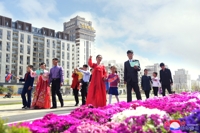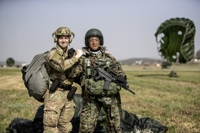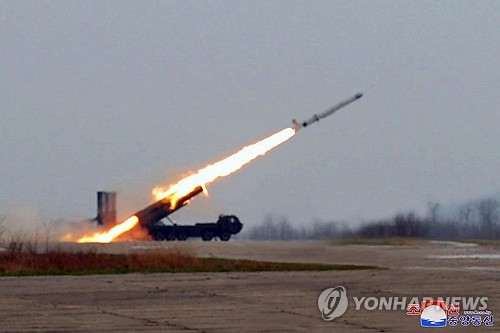(2nd LD) New virus cases rebound; cluster infections simmering beyond capital area
(ATTN: UPDATES with more details throughout; CHANGES photos)
SEOUL, July 1 (Yonhap) -- The number of new virus cases in South Korea bounced back Wednesday as cluster infections continued to increase in areas beyond the Seoul metropolitan area amid a sustained rise in imported cases.
The country added 51 cases, including 36 local infections, raising the total caseload to 12,850, according to the Korea Centers for Disease Control and Prevention (KCDC).
The tally marked a rise from 43 new cases of COVID-19 reported Tuesday and 42 cases on Monday.
Densely populated Seoul and the surrounding area accounted for most of the locally transmitted cases last month, but the virus outbreaks have been constantly reported in other parts of the country.
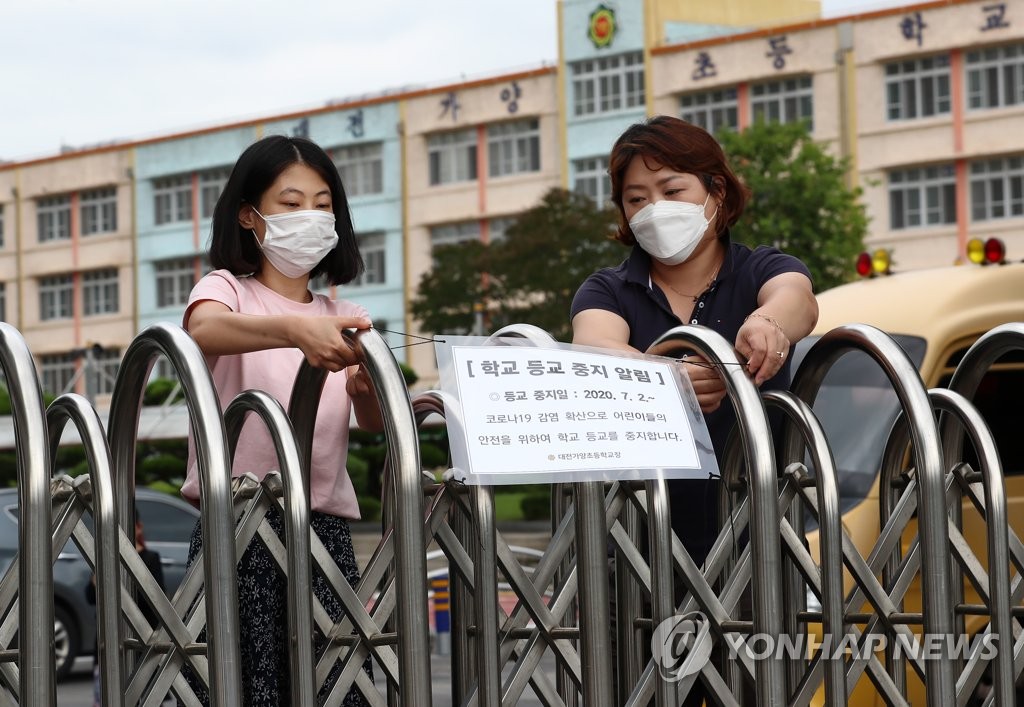
Officials at an elementary school in Daejeon, 164 kilometers south of Seoul, put up a sign on the front gate on July 1, 2020, that reads offline classes are temporarily suspended over the outbreak of the new coronavirus. (Yonhap)
Of local infections, 20 cases were reported in the greater Seoul area. Twelve cases were identified in the southwestern city of Gwangju, marking the first time that virus cases hit double-digit figures since the first outbreak in the city in February. Three cases were reported in the central city of Daejeon.
"Cluster infections at large-scale facilities subdued, but virus cases increased in connection to small-sized venues and gatherings," Vice Health Minister Kim Ganglip said in a briefing.
Kim voiced concerns that the virus is spreading into the central and southwestern regions beyond the greater Seoul area.
In yet another worrisome sign, two elementary students in Daejeon tested positive Tuesday after coming in contact with a peer, in what could be the first spread of the virus at a school in the country. Health authorities said they are conducting an epidemiological study on the cases
"Health authorities suspect (the Daejeon cases) might be caused by virus spread at school. An epidemiological study is under way," KCDC Director Jeong Eun-kyeong said in a briefing.
South Korea has been harried by rises in sporadic cluster infections in the greater Seoul area since it relaxed strict social distancing on May 6 on the flattened virus curve.
School reopening, completed in early June, is a key feature of the eased social distancing rules.
Cluster infections traced to small religious gatherings have emerged as the main cause for the latest spike in local infections.
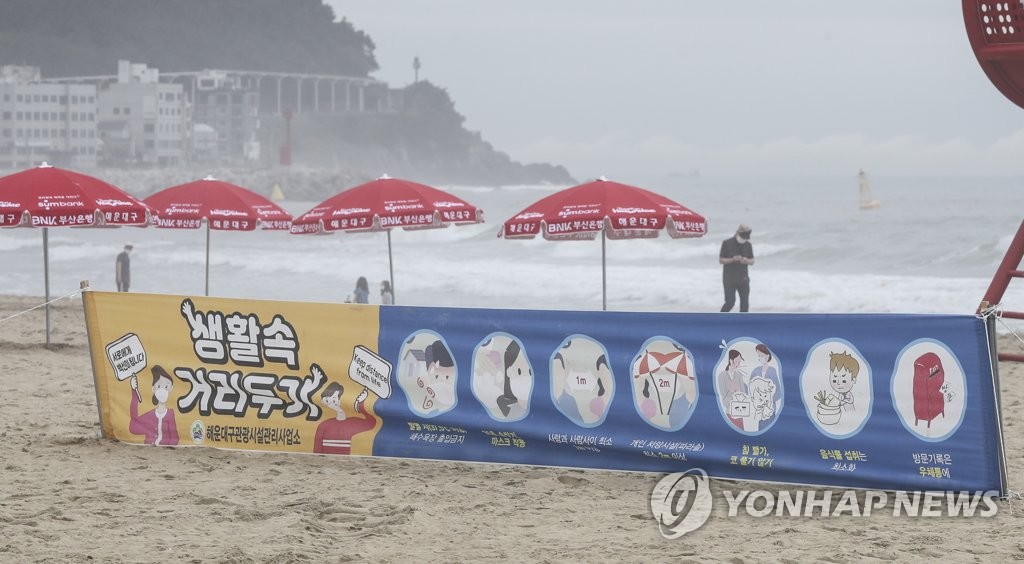
This photo, taken July 1, 2020, shows a banner set up at Haeundae Beach in the southeastern city of Busan that calls for maintaining social distancing due to the new coronavirus as the beach publicly opens. (Yonhap)
Cases traced to a major church in Seoul's southwestern ward of Gwanak reached 32 as of noon, up one case from the previous day. Cases tied to church gatherings in Suwon, south of Seoul, came to nine, up one over the past 24 hours.
Those linked to a Buddhist temple in Gwangju rose by five to 19.
At least six residents at an apartment building in Uijeongbu, north of Seoul, also tested positive.
The country, meanwhile, reported 15 additional imported cases, raising the total of such cases to 1,598.
It marked the sixth straight day that imported cases rose by a double-digit number.
Health authorities said that starting today, they will strengthen on-board inspections of foreign ships arriving from 54 high-risk countries, after assessing the degree of risks.
The move came as cluster infections tied to Russia-flagged ships laid bare the need to beef up quarantine checks at ports.
On-board quarantine checks have been underway on vessels coming from several risk-prone countries including China, Iran, Italy and Russia.
The KCDC will also conduct coronavirus tests starting next Monday on sailors who get off ships coming into the country. They will be also required to self-isolate for two weeks.
A rise in cases coming in from overseas put further strains on health authorities' virus fights, with some calling for the need to implement restrictive entry measures selectively. On Wednesday alone, eight cases were traced to arrivals from Kazakhstan.
South Korea, meanwhile, reported no additional deaths, bringing the death toll to 282. The fatality rate was 2.19 percent.
The total number of people released from quarantine after full recoveries stood at 11,613, up 76 from the previous day.
The country has carried out 1,285,231 tests since Jan. 3.
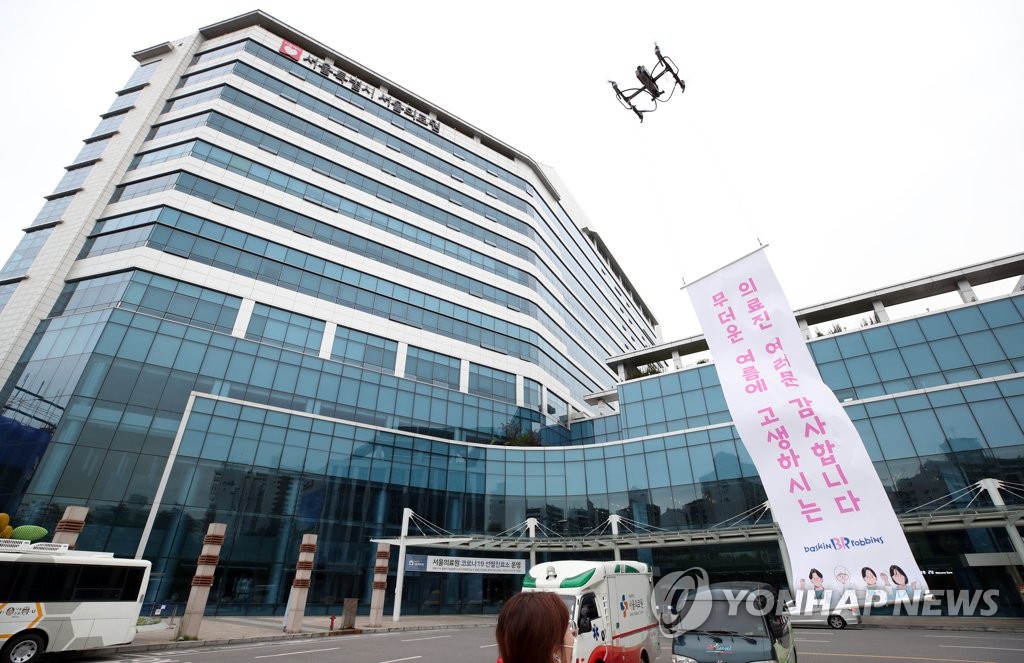
A drone with a banner that carries a thank-you message for medical workers fighting the new coronavirus flies around Seoul Medical Center in eastern Seoul on July 1, 2020. (Yonhap)
sooyeon@yna.co.kr
(END)
-
 Overdue debut of Korean abstract art pioneer Yoo Young-kuk at Venice Biennale
Overdue debut of Korean abstract art pioneer Yoo Young-kuk at Venice Biennale -
 Defense chief says N. Korea's hypersonic missile 'unsuccessful' in last-stage glide flight
Defense chief says N. Korea's hypersonic missile 'unsuccessful' in last-stage glide flight -
 Relax, immerse yourself in scents at Venice Biennale's Korean Pavilion
Relax, immerse yourself in scents at Venice Biennale's Korean Pavilion -
 N. Korea has capability to genetically engineer biological military products: U.S. report
N. Korea has capability to genetically engineer biological military products: U.S. report -
 S. Korea marks 30th anniv. of Korean Pavilion at Venice Biennale with contemporary art
S. Korea marks 30th anniv. of Korean Pavilion at Venice Biennale with contemporary art
-
 Overdue debut of Korean abstract art pioneer Yoo Young-kuk at Venice Biennale
Overdue debut of Korean abstract art pioneer Yoo Young-kuk at Venice Biennale -
 Relax, immerse yourself in scents at Venice Biennale's Korean Pavilion
Relax, immerse yourself in scents at Venice Biennale's Korean Pavilion -
 Artist Lee Bae captures ethereal Korean aesthetics at Venice Biennale
Artist Lee Bae captures ethereal Korean aesthetics at Venice Biennale -
 S. Korea marks 30th anniv. of Korean Pavilion at Venice Biennale with contemporary art
S. Korea marks 30th anniv. of Korean Pavilion at Venice Biennale with contemporary art -
 Defense chief says N. Korea's hypersonic missile 'unsuccessful' in last-stage glide flight
Defense chief says N. Korea's hypersonic missile 'unsuccessful' in last-stage glide flight
-
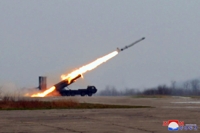 N. Korea says it conducted 'super-large warhead' test for strategic cruise missile
N. Korea says it conducted 'super-large warhead' test for strategic cruise missile -
 (2nd LD) N. Korea says it conducted 'super-large warhead' test for strategic cruise missile
(2nd LD) N. Korea says it conducted 'super-large warhead' test for strategic cruise missile -
 (LEAD) Yoon proposes first-ever meeting with opposition leader
(LEAD) Yoon proposes first-ever meeting with opposition leader -
(URGENT) N. Korea conducted 'super-large warhead' test for strategic cruise missile: KCNA
-
 Gov't likely to accept university chiefs' request to lower med school enrollment quota
Gov't likely to accept university chiefs' request to lower med school enrollment quota














